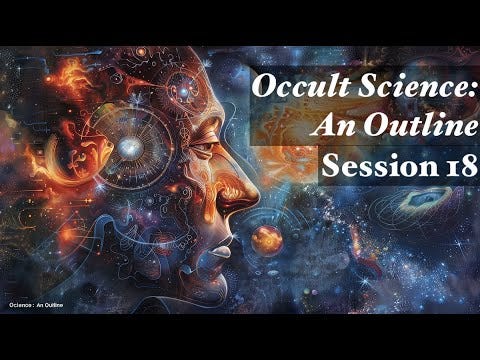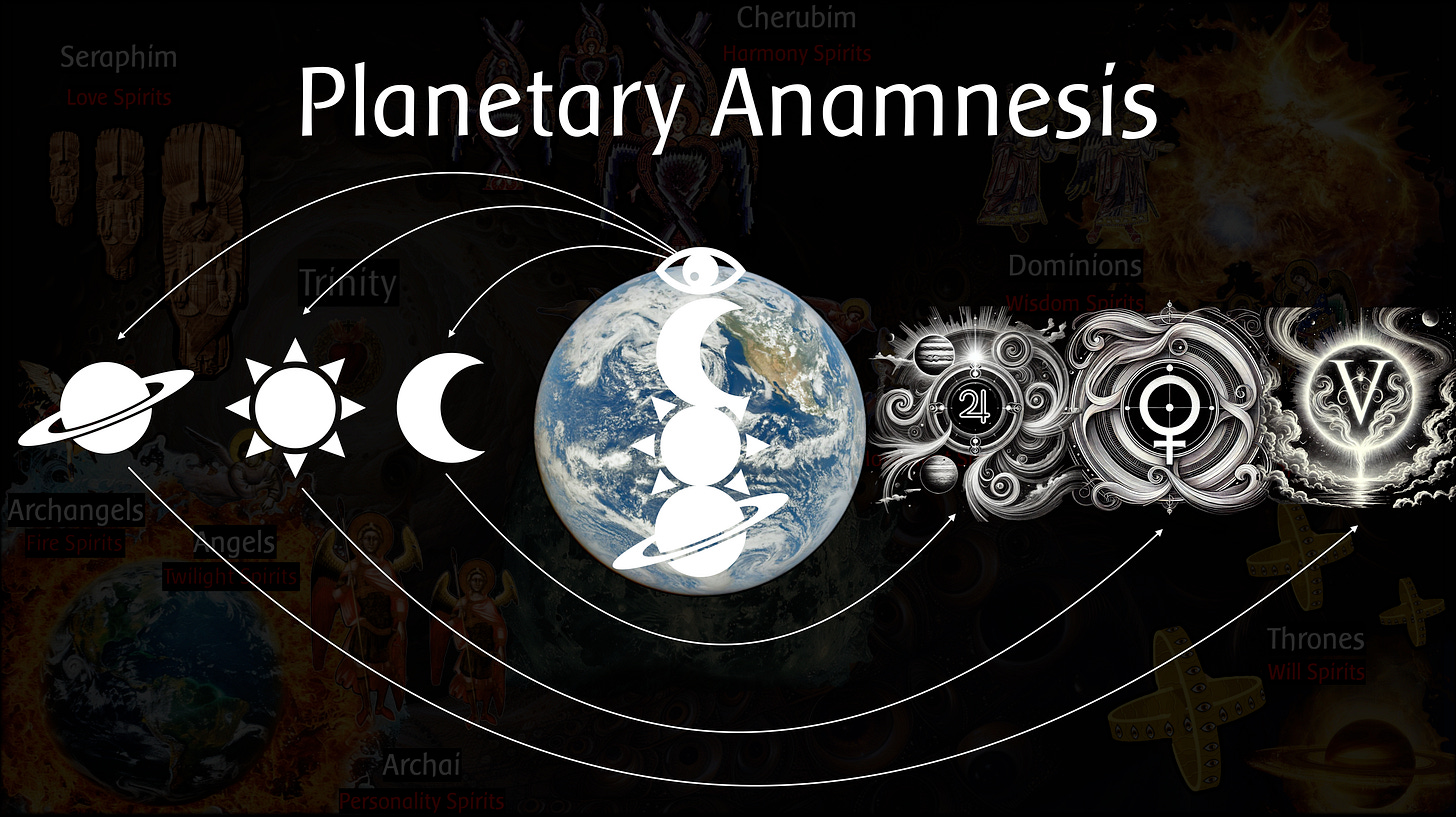Matt began the exploration of Steiner's vision of the future evolution of the world and humanity as articulated in Chapter 6 of Occult Science. Steiner's idea that knowledge of the present and future is latent in the past was central to the discussion. Matt highlighted Steiner’s assertion that the Earth contains spiritual facts and deeds accomplished during the Saturn, Sun, and Moon evolutions, which are now unfolded in the Earth.
Steiner describes a process of cosmic anamnesis or recollection, which depends on cultivating higher organs of supersensible perception. To perceive the future, one must remember the past, starting with the Old Moon's spiritual presence on Earth. By spiritually perceiving the Old Moon, one begins to foresee the future Jupiter state. Similarly, deeper clairvoyant capacities enable the perception of the Old Sun and the foresight of the Venus state, and recollection of Old Saturn leads to the perception of Vulcan. Steiner suggests that in recollecting these past cosmic states, we gain the capacity to see future states, emphasizing that future planetary epochs are only supersensibly perceivable as spiritual sound, light, and warmth.
Steiner argues that we cannot learn about past or future planetary epochs through ordinary sense perceptions or intellectual abstractions. While we can follow Steiner’s account of the past using our normal thinking abilities, true insight requires spiritual perception. He further explains that future planetary epochs cannot be contemplated with the same detachment as past events.
Steiner discusses how the Egypto-Chaldean epoch's revelations are being rediscovered through inner agency in our current epoch, influenced by the Christ event, which enhances our spiritual awareness and agency.
Matt shared his negative feelings and resistance to some of Steiner's ideas, particularly the notion of a speciation event where not all human beings evolve positively. He expressed discomfort with the idea that some will choose an evil path and be held back in the evolutionary process. Despite this, Steiner believes that the evolutionary influence of Christianity is still unfolding, with most of its impact yet to come. The science of the Grail, related to the Christ mystery and esoteric Christianity, is seen as crucial for humanity’s future evolution. Steiner emphasizes the need for higher knowledge to permeate human consciousness, predicting that the hidden knowledge of the Grail will grow and influence human thinking, feeling, and willing.
Laura expressed concerns about the idea of an “irredeemable Moon” and the evolutionary path that does not lead to love. Jeff K. related Steiner's evolutionary framework to therapeutic practices, particularly in homeopathy, where mineralization patterns in humans reflect future evolutionary stratifications. He emphasized the importance of understanding these patterns as prefiguring future phases of human evolution.
Karsten shared insights from the Danish teacher Martinus, who similarly envisioned a future where planet Earth moves into Christ consciousness, creating conditions for those ready to evolve into this state. He discussed the natural part of evolution where individuals may not resonate with this move and may incarnate on other planets more suitable for their aspirations. This perspective highlights the interplay between causality and intentionality, where unconscious evolution pushes individuals until they become conscious participants.
Lorenzo elaborated on the concept of feedback from the future, suggesting that future forms influence present actions. Matt compared this dynamic to musical notes seeking resolution.
Aly raised critical concerns about the potential hazards of characterizing non-Christians as underdeveloped and the implications for discussions on race. Matt and others emphasized the importance of recognizing the Christ impulse in diverse forms and avoiding exclusionary interpretations. Bruce supported this view by pointing to the warmth introduced in Mahayana Buddhism around the time of Christ, indicating the Christ impulse's influence beyond Christianity.
The session concluded with reflections on the “irredeemable Moon” and the complexity of hierarchical evolutionary concepts. Participants acknowledged the difficulty of these issues and emphasized the need for nuanced understanding. Matt wrapped up by expressing anticipation for the final chapter discussion in the coming week, encouraging continued engagement with Steiner’s challenging ideas.





I recognize the resistance Matt and Laura felt when reading about the idea of a ‘split’ in mankind between those who will be able to complete human evolution on the next planet Jupiter and those who won’t. It is interesting why some ideas are easier to digest than others. For me it helped to see if I could find and understand the Urphanomen underlying this event, because if we understand the place of this event in the big schema, and where it occurs at other moments/scales, we can maybe connect to it. The first thing that came to my mind was Darwinistic evolution in physical nature. Evolution only works because there is a diverse population in which some survive and some not, due to different levels of adaptation to the environment. Those surviving reproduce, making the next generation better adapted to the environment. So the created diversity can also be seen as a sacrifice of those who are less well adapted, to make the species stronger. Steiner mentioned that this split also occurs on old Saturn, Sun and Moon, leading to minerals, plants and animals on earth. Did you not feel the same resistance when reading this? Another chapter where I feel the same process is happening, is when he talks about sleep and death. He explains that after death, the astral body has to be cleaned from cravings that cannot be fulfilled outside earth. I feel there is also a split between elements of our soul that remain and get integrated in the I, and those that are lost forever. Death itself can be considered such a split as well. The physical body, and soon the etheric, will go their own way. Somehow we feel less shocked when thinking about our own death, than when we think about the ‘death’ of some part of the human race. We got used to the idea of our own death because we see it happening around us. But we don’t see cultures or parts of our own species die. The emotion, the resistance we feel when thinking about dying cultures, we can also use when thinking about our own death. This emotion can be an ultimate stimulans to make the best out of our lives. This is an example of how a principle at one level (the future death of our culture/species) can inspire real life at another level (the way we consider our own life, when realizing what death means). The mentioned resistance also shows that we find it hard to accept that we have to follow the big scheme of things, just like the rest in kosmos. Is this a rebellious cry for freedom that may influence the future, just like the rebellious hierarchies at some moment caused humans to follow a different path, leading to more autonomy, but probably a more difficult path?
With regard to Planetary Anamnesis, it is true that this inexorable plan of evolution over these seven spheres of total human consciousness is an inevitability. Thus, Self-Remembering is something that is already taking place, and found within the convolutions of the human brain.
https://rsarchive.org/Lectures/GA152/English/RSP1966/19130501p01.html
"In the present epoch of human life a delicate organ is being developed in man. It is not perceptible to anatomists and physiologists, yet it exists as an anatomical structure. This rudimentary organ is situated in the brain, near the organ of speech.
The development of this organ in the convolutions of the brain is not the result of the karma of individual souls but of human evolution as a whole on the earth; and in the future all men will possess it, no matter what the development of the souls incarnating in the bodies may be, and irrespective of the karma connected with these souls.
In a future incarnation this organ will be possessed by human beings who at the present time may be opposed to Anthroposophy as well as by those who are now in sympathy with it. This organ will in future time be the physical means, the physical instrument, for the application of certain powers of the soul; just as, for example, Broca's organ in the third convolution of the brain is the organ of the human faculty of speech.
When this new organ has developed it may either be used rightly by mankind, or it may not. Those people will be able to use it rightly who are now preparing the possibility of having in their next incarnation a true remembrance of the present one. For this physical organ will be the physical means for remembering an earlier incarnation—which in the case of by far the greater majority of people is possible now only through higher development, through Initiation. But a faculty which in the present epoch it would be possible to acquire only through Initiation will later on become the common property of mankind. Our modern knowledge was formerly the special knowledge possessed by the Atlantean Initiates only; everyone can now possess it. In the same way, remembrance of former lives on earth is possible at present only for Initiates but in times to come it will be possible for every human soul.
The Initiate is able to attain certain knowledge without the use of a physical organ, but this knowledge can become the common property of mankind only when a physical organ through which it can be acquired is developed in mankind as a whole in the course of evolution.
The reincarnated souls must, however, be able to use this organ in the right way and only those who in the present incarnation have inscribed occult thoughts and ideas in the Akasha-substance will be capable of this."
In today's world scope, this anamnesis is being cultivated by Michael, and through His emissary, Rudolf Steiner, and known as Anthroposophical Spiritual Science. It even has further extensions seen from 1900 to 1925.